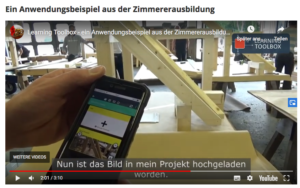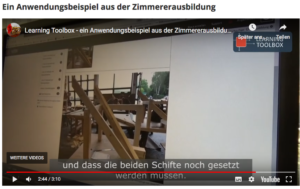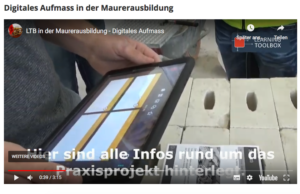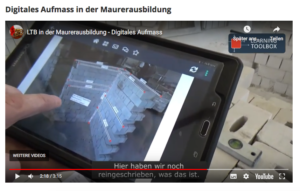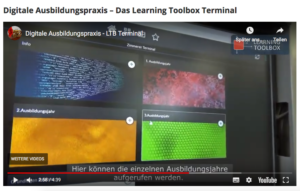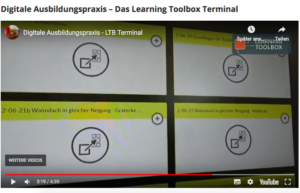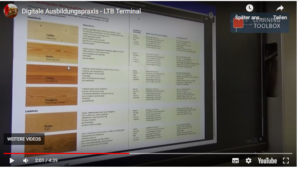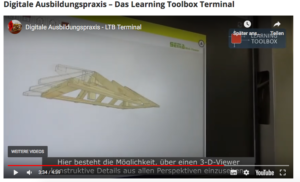New videos on innovative use of Learning Toolbox in vocational learning
In my latest post on this blog I reported on the new Support pages for users of Learning Toolbox (LTB) and Demonstration page with brief introduction and a video presentation. At the end of the post I mentioned that the developers of the LTB had also published three new videos that present innovative use of the LTB in the apprentice training of Bau-ABC Rostrup for different construction trades. These videos had been produced for promoting the use of LTB among other similar training centres in Germany. Therefore they are (for the moment) only available in German. All three videos are available on the following web page: https://support.ltb.io/fallvideos-learning-toolbox-im-bau-abc-rostrup/
Below I present some screenshots of these videos and then give a nutshell summary of the key messages that are conveyed by the respective videos.
Apprentice Jonas reporting on his carpenter’s project with the help of LTB
The two screenshots demonstrate, how apprentice Jonas documents an interim phase in his project in carpentry with the help of the LTB-app on his mobile phone. He takes a photo, gives it a title and then uploads it into the LTB-Stack of his trade as contribution to the current project. The trainer, who is supervising the project gets a notification and sees immediately from the LTB-Terminal in his office, what Jonas has reported and what he has to do in the next phase.
Apprentice Jannis using LTB in the context of masonry
Here the two screenshots demonstrate, how apprentice Jannis uploads the instructions for his new project in masonry by reading the QR-code from a mini-poster with his LTB-app. Firstly he synchronises the LTB on his tablet with a Leica-app on aseparate device. Then he takes a picture and edits it with a line and then takes measures with the laser of the Leica-app. At the end he shows the completely edited picture with all the necessary measurements with explanations in the picture. All this has been achieved with the help of the LTB-app on his tablet PC.
Using the shared LTB-terminal as support for trainers and apprentices in the trade of carpentry
The third video presents the LTB-terminal that has been developed for the training of carpenters – one terminal at the office of the supervising trainers and the other as a ‘kiosk’ to be used by the apprentices at the carpentry workshop. The following screenshots give insights into different potentials of the LTB-terminal.
The first two pictures show that the LTB-terminal (whether in the office or at the workshop) provides access to the training contents of the respective trade firstly as an overview on the whole training year and then at the level of particular projects. In this context it is worthwhile to note that the apprentices can compile their individual learning logs (consisting of completed projects) throughout their training and save them in their own project spaces of the respective LTB-stack. In this respect the LTB has provided a digital solution for the former paper-based White Folder of the training centre Bau-ABC Rostrup.
As further support for training and learning the LTB-terminal provides additional resources. Above the first picture demonstrates the ‘dictionary’ (Lexikon) space of carpenters. It provides overviews on training materials, health and safety and other apps that are being used in the training. All this information is based on reliable sourcesand has been validated by the responsible trainers. The second picture demonstrates the 3D-viewer for carpentry that gives multiple insights into wooden constructions.
—
I think this is enough of these videos. As I see it, the trainers and apprentices have made great progress as users of the LTB. Thus, the toolset (with these further user-initiated additions) has made its case as support for vocational and workplace learning in the construction sector. Moreover, it is worthwhile to follow the further developments in the field.
More blogs to come …
